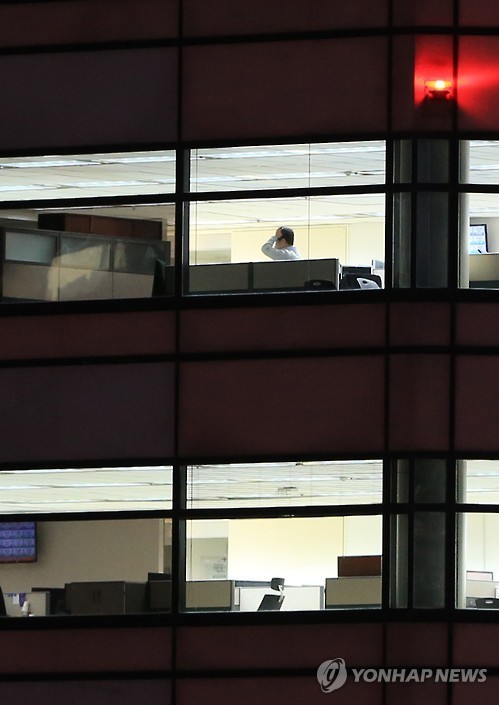Korean firms hurt by rigid workplace culture: survey
By Korea HeraldPublished : March 15, 2016 - 17:58
A rigid corporate culture marked by authoritative leadership and unproductive work hours are some of the key factors that undermine the global competitiveness of many Korean companies, according to a survey on Tuesday.
In a joint study on 100 firms and their 40,000 employees, conducted by the Korean Chamber of Commerce and Industry and McKinsey Korea, the majority were found to be suffering from chronic management problems. Only 10 firms were found to have commendable practices.
The KCCI and McKinsey used the Organizational Health Index to compare the corporate cultures of the surveyed firms with 1,800 global companies.
The survey results highlighted that Korean companies are struggling especially with authoritative leadership, collective organizational incapability, and excessive reliance on external factors in running businesses.
“The mindset of the CEO is the key to changing (the Korean) corporate culture,” said the KCCI.
The chamber plans to host forums to help the CEOs of major companies change their perspectives.
The research findings also revealed a disparity between assessments carried out by the management and employees.
The management gave the organization top scores, while employees issued bottom scores. The two groups differed most on how they viewed work culture. Other major factors included leadership problems and the direction of the organization’s business.
Only half of the surveyed companies were considered to have “DNA for continuous growth,” which was 16 percent lower than other global companies.
Nearly all of them -- 98 percent -- said their companies were execution-driven, focusing on both ceaseless and aggressive work styles, which contrasted with their global counterparts who responded that their firms were focused on leadership and markets.
In a joint study on 100 firms and their 40,000 employees, conducted by the Korean Chamber of Commerce and Industry and McKinsey Korea, the majority were found to be suffering from chronic management problems. Only 10 firms were found to have commendable practices.
The KCCI and McKinsey used the Organizational Health Index to compare the corporate cultures of the surveyed firms with 1,800 global companies.
The survey results highlighted that Korean companies are struggling especially with authoritative leadership, collective organizational incapability, and excessive reliance on external factors in running businesses.
“The mindset of the CEO is the key to changing (the Korean) corporate culture,” said the KCCI.
The chamber plans to host forums to help the CEOs of major companies change their perspectives.
The research findings also revealed a disparity between assessments carried out by the management and employees.
The management gave the organization top scores, while employees issued bottom scores. The two groups differed most on how they viewed work culture. Other major factors included leadership problems and the direction of the organization’s business.
Only half of the surveyed companies were considered to have “DNA for continuous growth,” which was 16 percent lower than other global companies.
Nearly all of them -- 98 percent -- said their companies were execution-driven, focusing on both ceaseless and aggressive work styles, which contrasted with their global counterparts who responded that their firms were focused on leadership and markets.

Employees said that working overtime was at the heart of the managerial problems they face. On average, the surveyed employees said they worked overtime for 2.3 days out of 5 working days. Among them, 43.1 percent worked overtime at night for more than three days a week. Only 12.2 percent said they did not work after official hours.
The KCCI pointed out that an “unscientific work process” and a “rigid top-down approach” were forcing employees to work after hours.
The survey also said working more hours at night actually undermined employee productivity.
By Hong Sung-pyo
(hong1@heraldcorp.com)
-
Articles by Korea Herald









![[Weekender] Korean psyche untangled: Musok](http://res.heraldm.com/phpwas/restmb_idxmake.php?idx=644&simg=/content/image/2024/05/02/20240502050841_0.jpg&u=)








![[Eye Interview] 'If you live to 100, you might as well be happy,' says 88-year-old bestselling essayist](http://res.heraldm.com/phpwas/restmb_idxmake.php?idx=652&simg=/content/image/2024/05/03/20240503050674_0.jpg&u=)
